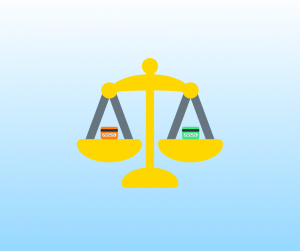Financial Skills to Master for a Better Credit Score

Want to Protect Your Credit? Try a Savings Challenge
01/28/2023
Metro 2, e-OSCAR, and the Credit Repair Dispute Process
02/16/2023 Financial skills take time to learn and master. Although it would be nice if we all came into the world with top-notch financial skills, that’s simply not the reality of our world. Instead, it takes some luck to stumble onto the right resources to build smart financial habits.
Financial skills take time to learn and master. Although it would be nice if we all came into the world with top-notch financial skills, that’s simply not the reality of our world. Instead, it takes some luck to stumble onto the right resources to build smart financial habits.
With the right financial habits, you can transform your financial future. But with the wrong financial skills, you might be digging yourself into a deeper hole. If you aren’t sure where to start building financial skills, you are in the right place. We will take a closer look at some of the top financial skills to master. Not only will these financial skills help you take your finances to the next level, but they can also help you attain a better credit score.
Why Financial Skills Matter
Whether we like it or not, money plays a big role in our lives. Even when money isn’t directly involved, many of our decisions and options come back to our money management. For example, you might have the life goal of spending a summer in Paris. Although that’s not strictly a financial goal, smart money moves are required to make it happen.
With the right financial skills, you can make your lifestyle goals a reality. And the best part is that everyone can build financial skills over time. Of course, building financial skills might not come naturally to everyone. But with practice, it’s possible to get your finances moving in the right direction.
Why Financial Skills Matter to Your Credit Score
When you develop savvy financial skills, the impacts will have a positive effect on your money situation. For example, building the financial skill of saving can allow you to reach your life goals.
Your credit score is one area of your finances that can see a positive impact due to smart financial skills. Essentially, a credit score is a three-digit number that is based on your credit management actions. You can think of your credit score as a GPA of how well you handle your debt. But like the underlying report card of grades, your credit score is impacted by your financial management decisions.
Typically, a good credit score can follow good financial habits. But bad financial habits often lead to a bad credit score. Since a good credit score goes hand in hand with financial know-how, building out your financial skill set can make a big difference.
8 Financial Skills to Master for a Better Credit Score
If you are ready to build your financial skills, a better credit score might be one of the many benefits within your reach. Here’s a closer look at key financial skills to master for a better credit score.
Building a Budget
Budgeting is a keystone financial skill that can transform your situation. Essentially, a budget involves mapping out what you want to spend in specific categories. For example, you might decide you only want to spend $200 on groceries for the month.
When you think of budgeting, unpleasant thoughts might come to mind. Many assume that budgeting is a constraining practice that puts a cramp on their choices. Instead of approaching budgeting with a negative mindset, it can help you reframe the concept of budgeting in a positive light.
As you build out a budget, try to make it a realistic reflection of how you’d like to spend your funds. For example, you might want to cut back on extra coffee or clothes in order to dedicate more funds to your hobbies.
I enjoy budgeting because I’ve built in the wiggle room I need to feel comfortable. Personally, I include a dedicated budgeting category for “fun.” With that breathing room, I have the flexibility to make some minor splurges without consulting the budget. If possible, give yourself the flexibility you need to stay on target.
Sticking to a Budget
It’s not enough to create a budget. In order for a budget to be effective, you’ll need to stick to your budget closely. Of course, sticking to your budget is sometimes easier said than done.
If possible, try to focus on controlling what you can control within your budget. For example, you can’t control getting a flat tire that throws an extra expense into your budget. But you can prevent overspending on unnecessary purchases.
If you want to stick with a budgeting plan, one helpful strategy is to track your expenses. Throughout the month, you can check in with your spending to determine where you stand. When you check in, you’ll have the ability to make any necessary adjustments.
You can manually track your budget with a pen and paper or a digital spreadsheet. But if you are looking for a more automated option, consider using a free tool like Mint.
Putting Money Away for a Rainy Day
It’s true that saving money isn’t always as much fun as spending it. But saving money on a regular basis is a key financial skill for many reasons.
First, saving money on a regular basis allows you to build up an emergency stash. With that emergency fund in place, you are less likely to turn to credit during an unexpected cash flow crunch. Instead, you can simply fall back on your savings to get you through. Not only will this create a less stressful experience, but you might also avoid going into debt and paying thousands of dollars in interest costs.

Many experts recommend building up an emergency fund that holds three to six months’ worth of expenses. For example, if you spend $2,000 per month, then an ideal emergency fund would hold between $6,000 to $12,000.
However, this rule of thumb isn’t the right amount for everyone. Some households with limited expenses might maintain a smaller emergency fund. But households with an irregular or unpredictable income might push for a larger emergency fund.
Regardless of your emergency stash goals, building the habit of saving every month is important. Depending on your situation, you might not be able to save much yet. But remember that every little bit counts. For example, saving $20 every other Friday for an entire year would lead to over $500 in savings by the end of the year.
Checking Your Credit Report
Your credit report is a collection of information about your credit management activities. The information on this report contributes to your credit score. With that, regularly checking your credit report is a financial skill to stay on top of.
It’s free to check your credit report at annualcreditreport.com. You can also request a copy of your credit report from each of the credit bureaus on an annual basis. But due to the pandemic, the three major credit bureaus have been providing a free credit report every week.
Once you have a copy of your credit report in hand, it’s time to review it for errors. Unfortunately, mistakes happen. For example, a creditor might accidentally list a late payment on your account. Or a fraudster might get a hold of your information and open several credit cards in your name.
If you find any errors, it’s important to correct them immediately. You can contact the credit bureau with the details about the mistake. From there, the credit bureau should make the changes within 30 days. If you leave mistakes on your credit report, they can drag down your credit score. After all, it’s unlikely that a fraudster will be paying off those credit cards on time.
Making On-time Payments a Priority
When it comes to your FICO score, your payment history is one of the most important factors. In fact, this factor represents 35% of your credit score. If you have a history of on-time payments, that will have a positive impact on your credit score. But if you have a spotty payment record, that can drag down your credit score.
Not only will making on-time payments have a positive impact on your credit score, but this skill can also help you avoid financial stress. Of course, making on-time payments isn’t always easy.
If you have the option, try setting up automatic payment tools. Most bill providers have an automatic payment option available. Once you set this up, you never have to worry about forgetting a deadline again.
But sometimes, forgetfulness isn’t the culprit. If you are having cash flow issues, paying your bills on time might seem impossible. At this point, it’s time to comb over your spending for any areas where you can cut back.
If cutting back isn’t enough, reach out to your lender as soon as possible. In some cases, your lender might be willing to work out a temporary arrangement. Depending on the situation, they might be able to push your payment deadline back or arrange for a lower monthly payment. That’s especially true if you’ve regularly made on-time payments in the past.
Never Spending More Than You Can Reasonably Repay
In today’s world of constant advertisements, the temptation to overspend is a daily threat. While a small splurge here and there probably won’t hurt you, regularly overspending can lead to long-term financial problems.
To combat this problem, be mindful of your spending. Although a lender or retailer might be willing to sign you up for a payment plan, consider what you can truly afford before jumping in. For example, consider skipping a discretionary purchase that you need a Buy Now Pay Later service to pay for.
Additionally, avoid getting anywhere close to maxing out your credit cards. Instead, only charge what you can afford to repay this month. Plus, your credit score will benefit from keeping your credit utilization low.
Although mindful spending might mean cutting out some purchases, the long-term rewards are often worth it.
Considering Your Financial Future
As we make our way through life, it’s often difficult to picture an older version of ourselves. Instead, we tend to think more about the present and the immediate future. But it’s critical to start thinking long-term when it comes to finances.

One way to start thinking long-term is by paying off your debts. Choosing to pursue an aggressive debt repayment strategy, like the snowball or avalanche methods, can propel you toward a brighter financial future.
If you want to take things a step further, try to imagine your retirement. It might be difficult to picture retirement. However, age seems to have a way of sneaking up on us. If possible, start setting aside money every month for your retirement.
Delaying Gratification
Delaying gratification is a life skill that has major financial impacts. Essentially, the concept of delaying gratification involves choosing to forgo some level of happiness now in return for a future reward.
For example, choosing to forgo a night out could help you save for the future vacation you’ve been craving. In our world, it seems especially difficult to practice delayed gratification. But your future self will thank you.
Frequently Asked Questions
How Can I Improve My Financial Skills?
If you want to improve your financial skills, the process starts with building financial literacy. The more you learn about the fundamentals of personal finance, the easier it is to build smart financial skills.
A few ways to improve your financial skills include starting a budget, reading personal finance books, and paying your bills on time. For more tips and strategies to improve your finances, check out the resources in our Knowledge Center!
What Are Basic Financial Skills?
Some basic financial skills include sticking to a budget, saving every month, investing for the future, and using credit responsibly. Each of these basic financial skills can have a major impact on your life.
Is It Possible To Master Financial Skills?
Yes. Although learning something new is often a challenge, it’s still possible to master financial skills. Regardless of where you are starting from, mastering financial skills can propel you toward your long-term financial goals.
The Bottom Line
When you build your financial skills, all areas of your finances can see a positive impact. With that, it’s possible that learning savvy financial management skills will lead to a higher credit score over time. It’s helpful to be patient. But in many cases, a good credit score will follow if you master key financial skills.
Want advice on how to build credit fast? Check out this infographic.





